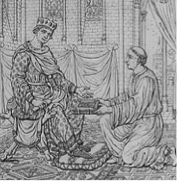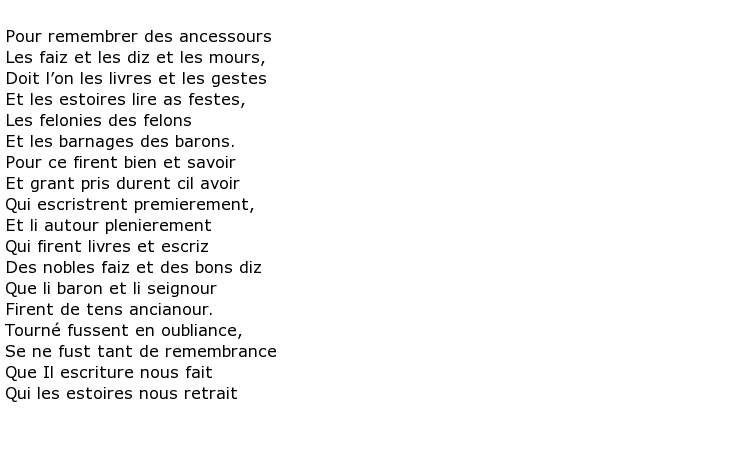 Robert Wace was a 12th century French poet and holy man who eventually became the Canon of Bayeux. He is often referred to simply as Wace although there have been a number of variations on that name throughout history. Depending on where you come from it could be pronounced or written as Wasso, Gace, Vace or Vacce.
Robert Wace was a 12th century French poet and holy man who eventually became the Canon of Bayeux. He is often referred to simply as Wace although there have been a number of variations on that name throughout history. Depending on where you come from it could be pronounced or written as Wasso, Gace, Vace or Vacce.
Details of his life are, understandably, a little confused, often relying on supposedly autobiographical notes to be found within his poems. It is believed that he was born sometime between the years 1099-1111 on the island of Jersey which is one of the cluster now known as the British Channel Islands, lying just off the coast of French Normandy. He was sent to the mainland as a boy and was educated in the town of Caen. Speculation exists that he may have come from an aristocratic family as it is unlikely that he would have been sent away to be educated otherwise.
He seems to have returned to Jersey for a while before travelling once more to Caen to take up teaching and, thus, beginning his ecclesiastical journey. He wrote two major pieces of work that some might regard as true historical accounts of the early days of Britain and Normandy, although it might be safer to consider these accounts as legends rather than historical fact.
Roman de Brut describes, in verse form, the history of Britain from the time of its founding by Brutus of Troy, the legendary first king of Britain. Interestingly it touches on the legend of King Arthur and it is believed to contain the first references to Arthur’s Round Table and his magical sword, Excalibur. The poem contains fairly extensive descriptions of military conflicts of that time, even if the actual campaigns that he describes were invented. His work suggests that Wace had an extensive knowledge of ancient warfare methodologies.
Later in his life Wace wrote Roman de Rou which describes, also in verse, the history of the Dukes of Normandy. It is believed that the English King Henry II commissioned this work and gives the reader a good understanding of the Norman conquests of England by William the Conqueror. He was able to document extensively the preparations for the famous Battle of Hastings, perhaps using written testimonies from relatives who were actual eye witnesses to the event. His poem also refers to an appearance by the famous Halley’s Comet. Although received with interest at the time, the popularity of Roman de Rou waned as time went by, especially after Normandy was incorporated into the greater Kingdom of France in 1204.
Here are the opening lines, in French, of the Prologue to Roman de Rou:

Wace’s poetry was written in a so-called Romance language, a mixture of Old Norman and Old French while some believe that this evolved into what is now known as Jèrriais, the form of Normandy French still spoken by a few on the island of Jersey. Some regard this as “Wace’s language” and he is seen as the founder of literature on the island.
When Wace became Canon of Bayeux he adopted the title Maistre Wace and his Christian name was barely used after that. It is believed that he died some time during the year 1174 which would have put him at an age somewhere between 64 and 74. He is commemorated with a granite memorial stone, built into the side of the States Building in Jersey. It includes a couple of lines from Roman de Rou which express the pride that Wace felt in the place of his birth. Translated into English the inscription reads:


